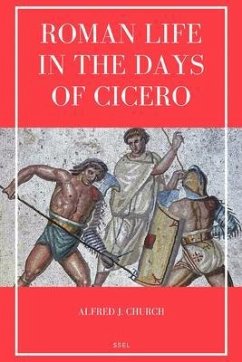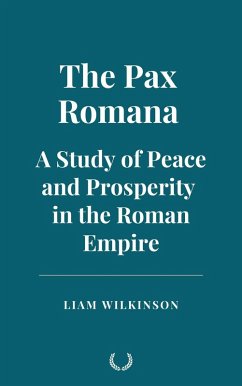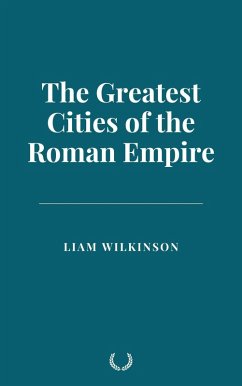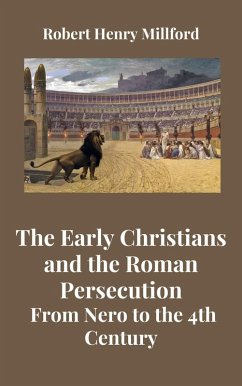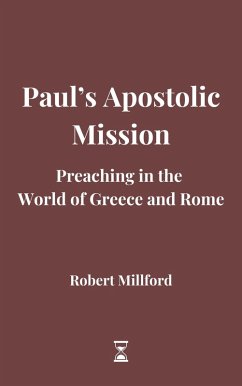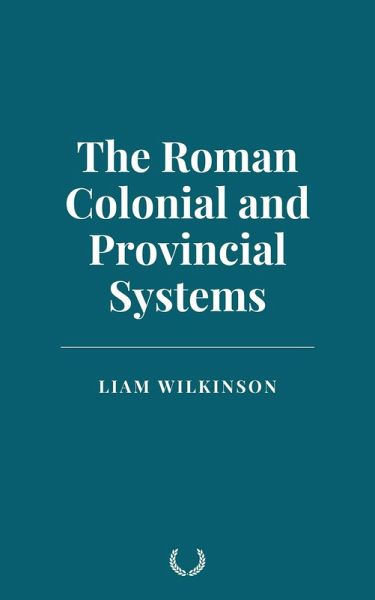
The Roman Colonial and Provincial Systems (eBook, ePUB)

PAYBACK Punkte
0 °P sammeln!
This book explores the Roman colonial and provincial systems, examining how the Roman Empire governed its vast and diverse territories. From the early Republic to the fall of the empire, Roman provinces played a critical role in maintaining the stability, economic prosperity, and cultural integration of the empire. The book delves into the administrative structures established by emperors such as Augustus, Diocletian, and Constantine, focusing on the evolution of provincial governance, taxation, military organization, and the role of local elites.Key themes include the division of provinces in...
This book explores the Roman colonial and provincial systems, examining how the Roman Empire governed its vast and diverse territories. From the early Republic to the fall of the empire, Roman provinces played a critical role in maintaining the stability, economic prosperity, and cultural integration of the empire. The book delves into the administrative structures established by emperors such as Augustus, Diocletian, and Constantine, focusing on the evolution of provincial governance, taxation, military organization, and the role of local elites.
Key themes include the division of provinces into senatorial and imperial territories, the reliance on local elites to administer regions, the Roman legal system, and the cultural process of Romanization. The book also explores the impact of reforms, such as Diocletian's subdivision of provinces and Constantine's establishment of Constantinople, on provincial life and governance.
The Roman provincial system left an enduring legacy on Western civilization, influencing modern legal and political systems, urban planning, and governance. Roman law, urban infrastructure, and the concept of citizenship shaped the development of Europe and other regions long after the fall of the empire. The integration of diverse cultures and peoples under a common legal and administrative system offers valuable insights into the empire's ability to sustain a cohesive political structure across vast distances and cultural differences.
In addition, the book addresses the economic and social impact of Roman reforms on provincial populations, exploring how changes in taxation, military recruitment, and local governance affected the daily lives of inhabitants. The legacy of the Roman provincial system continues to resonate in modern governance, law, and urbanization, highlighting its profound influence on world history.
Key themes include the division of provinces into senatorial and imperial territories, the reliance on local elites to administer regions, the Roman legal system, and the cultural process of Romanization. The book also explores the impact of reforms, such as Diocletian's subdivision of provinces and Constantine's establishment of Constantinople, on provincial life and governance.
The Roman provincial system left an enduring legacy on Western civilization, influencing modern legal and political systems, urban planning, and governance. Roman law, urban infrastructure, and the concept of citizenship shaped the development of Europe and other regions long after the fall of the empire. The integration of diverse cultures and peoples under a common legal and administrative system offers valuable insights into the empire's ability to sustain a cohesive political structure across vast distances and cultural differences.
In addition, the book addresses the economic and social impact of Roman reforms on provincial populations, exploring how changes in taxation, military recruitment, and local governance affected the daily lives of inhabitants. The legacy of the Roman provincial system continues to resonate in modern governance, law, and urbanization, highlighting its profound influence on world history.
Dieser Download kann aus rechtlichen Gründen nur mit Rechnungsadresse in A, B, CY, CZ, D, DK, EW, E, FIN, F, GR, H, IRL, I, LT, L, LR, M, NL, PL, P, R, S, SLO, SK ausgeliefert werden.




